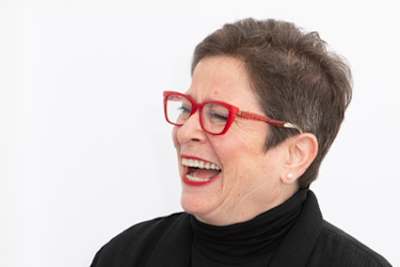You’ve only gone and got through to the interview stage. Well done, buddy. But now what? What the hell are you going to wear? Maybe you’ll totally fluff your words or call them ‘mum’ by mistake. And will you be able to stop your palms from sweating?
These are all things Executive Coach, Speaker and Lecturer Deena Gornick has got your back on when it comes to slaying your next interview. Deena’s been in the industry for 30 years, working with clients to help facilitate their success in both professional and private lives, from bossing interviews to presenting to a room full of frankly terrifying people.
In 2022, Deena worked on Red Bull Join The Team. The programme offered internships in various Marketing roles at Red Bull Racing, aiming to provide a route for young people seeking to break into the world of Formula One.
So, back to those sweaty palms. Here’s how to boss your next interview, according to Deena…
01
Consider what you’re going to wear
“It's really important to pay attention to how you dress. Make sure that you're physically comfortable – there's nothing more off-putting than somebody who’s borrowed something that doesn't quite fit or shoes they can’t walk in. I remember interviewing years ago for my role with Red Bull and I was told by the agency that put me forward to absolutely not wear a suit but to wear jeans. I thought they were joking, but it turned out that I would have been really out of place had I gone in a suit and it would have been clear that I didn't understand the brand at all.”
02
Do a warm up (even if it’s in the loo)
“Get to the interview at least 20 minutes early so that you're not rushed. Find somewhere where you can’t be seen, so if push comes to shove, go to the restroom and do a warm up. Do something where your muscles are tense and then relaxed and repeat this a few times. Do as much as you can to prepare your body because it's going to tense up and you want to be able to control that as much as you can, the same way that an opera singer would warm up before she goes on stage or how an athlete would warm up before a race.”
03
Remember that lack of experience can be a good thing
“One of the biggest hurdles that people will face is that they're inexperienced, and that they feel it will hinder them. Actually, sometimes it can be a great asset. If somebody young and lacking in professional experience puts themselves forward, this can be refreshing to somebody who has interviewed a long line of highly experienced people who think that experience is all they need. Employers are looking for somebody who's enthusiastic, somebody who's energetic – they're looking for somebody who's keen to learn and whose naivete (for want of a better word) is actually a wonderful asset because there's nothing to unlearn.”
04
Ask yourself if the job is the right fit for you
“A job or internship is a really important decision that not only they're making, but you're making, too. It’s going to be a place where you are going to be spending a considerable amount of your time, so make sure it’s something that’s going to enrich your life, something that inspires you and feeds your soul. Consider if the environment and the people around you encourage you to learn and that your boss has an interest in your development. Ask about the team and the values of the organisations and remember that this type of scrutiny will have a double effect – most importantly, you will ensure yourself that you are making the right decision for you. You're giving them an enormous investment and you want to make sure you’re spending your career years in the right place. Not only that, it shows that you’re a proactive adult trying to make a nest and not a baby bird waiting to be fed! So use this opportunity to really make sure that you're asking questions that will help you build a picture of what that place is going to be like.”
05
Don’t try to fake confidence, instead sit with your nerves
“It's a well known fact that confidence doesn't exist, but courage does and this can't be faked. Courage is about owning the level of gravitas that you possess, pausing, breathing and not fussing. So, if you’re feeling like you’re lacking in courage, sit with the fact that you feel nervous and accept what's going on inside of your head. Focus your energy on making sure that your body is open, your shoulders are relaxed and your eyes are focused on the person that you're speaking to. If there's more than one person in the interview, pay attention to every single one – it doesn’t matter about the hierarchy, you should treat them equally. Think about the answers that you are giving and remember that the more you pause, the more time you give yourself to really think about what you're going to say. It also gives the interviewee(s) time to process what you’ve just said. By practicing this, you may find your courage grows.”
06
Be present
“It might seem obvious, but being present and in the moment during an interview is one of the most important skills to exhibit. Of course, long-term, employers want someone who is present, so showing this in an interview can mean the difference between getting the job and not. There's no greater gift that you can give to someone than your attention and regrettably, today, that's rare. Be mindful that your feet are flat on the floor, that you’re breathing fully and that you’re looking into the eye of the camera [if you’re interviewing remotely]. Be mindful of where your hands are, if you’re feeling nervous or if your heart is racing. Don’t try to change it or deny it – just breathe with it. Think of it as a bit like mindfulness but in a professional environment.”
07
Be as authentic as possible
“In my past life as a Theatre Director, it was awful when you cast somebody and they came to rehearsal as a very different person than the person who interviewed for the role. It’s something I see all the time with clients who hire somebody who interviewed; they're professional, they're polished and they're crisp. They then start to work and it's awful and they are not the person who they first met. When somebody is authentic at an interview, and they say things like, “I don't know the answer to that question and I’m upset because I'm really interested in this job,” hopefully the interviewer would value their honesty and understand that we are all human at the end of the day. People are more likely to remember how you made them feel during an interview. For instance, whether you made them laugh, energised them, made them feel comfortable and this can only come across when you’re being your authentic self. Maya Angelou said it first: “People will forget the things you do, and people will forget the things you say. But people will never forget how you made them feel,” and it’s absolutely true.
08
Stay curious
The most important thing to bring to an interview, apart from genuine energy and enthusiasm, is curiosity. Write down as many questions as you can think of that you would like to know about the place. Lots of people treat an interview as though the person interviewing them is asking the only important questions but that’s not the case. Your questions are equally valid. Go in with as much curiosity as you possibly can and forget any assumptions that you may have about the person who's interviewing you. You might be being interviewed by the CEO or their PA – just go in with the assumption that you’re both human and both have a role to play.
And finally… anybody who's interviewing somebody is actually as nervous as you are, because they have to make sure they choose the right person for the job.
Dreaming of a career in Motorsports? Find out how Red Bull Racing employees got their big break to work in F1.


